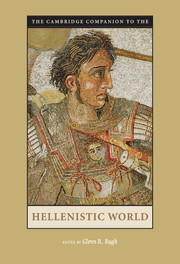Book contents
- Frontmatter
- Introduction
- 1 Alexander the Great and the Creation of the Hellenistic Age
- 2 The Hellenistic Kingdoms
- 3 The Polis and Federalism
- 4 Hellenistic Economies
- 5 The Hellenistic Family
- 6 History and Rhetoric
- 7 Material Culture
- 8 Hellenistic Art: Two Dozen Innovations
- 9 Language and Literature
- 10 Greek Religion: Continuity and Change in the Hellenistic Period
- 11 Philosophy for Life
- 12 Science, Medicine, and Technology
- 13 Hellenistic Military Developments
- 14 Greeks and Non-Greeks
- 15 Recent Trends and New Directions
- Hellenistic Dynasties
- Works Cited
- Index
11 - Philosophy for Life
Published online by Cambridge University Press: 28 November 2007
- Frontmatter
- Introduction
- 1 Alexander the Great and the Creation of the Hellenistic Age
- 2 The Hellenistic Kingdoms
- 3 The Polis and Federalism
- 4 Hellenistic Economies
- 5 The Hellenistic Family
- 6 History and Rhetoric
- 7 Material Culture
- 8 Hellenistic Art: Two Dozen Innovations
- 9 Language and Literature
- 10 Greek Religion: Continuity and Change in the Hellenistic Period
- 11 Philosophy for Life
- 12 Science, Medicine, and Technology
- 13 Hellenistic Military Developments
- 14 Greeks and Non-Greeks
- 15 Recent Trends and New Directions
- Hellenistic Dynasties
- Works Cited
- Index
Summary
A New Type of Philosophy?
In 323 b.c., Alexander the Great died. It was also - and not coincidentally - the year in which Aristotle left Athens, allegedly saying that he did not want the Athenians to sin against philosophy a second time. He was clearly identified with the Macedonian cause (even though the story later grew up that he had arranged for Alexander to be poisoned); and the fortunes of his school, the Lyceum, in the rest of the century (flourishing under Demetrios of Phaleron; forcibly closed for a time in 307/6 after Demetrios of Phaleron was driven out by Demetrios Poliorketes), show the ways in which political allegiances impinged on philosophy.
The coincidence of date has helped to further a myth, which like many myths contains a partial truth. From late antiquity onwards Plato and Aristotle have been studied more than any other ancient Greek philosophers; many university philosophy courses have jumped from Aristotle to Descartes without as much as a glance at the intervening eighteen centuries. And in some quarters, it has been thought that ancient philosophy after Aristotle, beginning with the Hellenistic period, was inferior or decadent. Sometimes the objection has been to materialism - a charge that can itself be traced back to late antiquity and which, like many charges, reveals as much about the views of those who make it as about its target. (Others, indeed, have praised Epicurus for his allegedly atheistic materialism.)
- Type
- Chapter
- Information
- The Cambridge Companion to the Hellenistic World , pp. 223 - 240Publisher: Cambridge University PressPrint publication year: 2006
- 2
- Cited by

